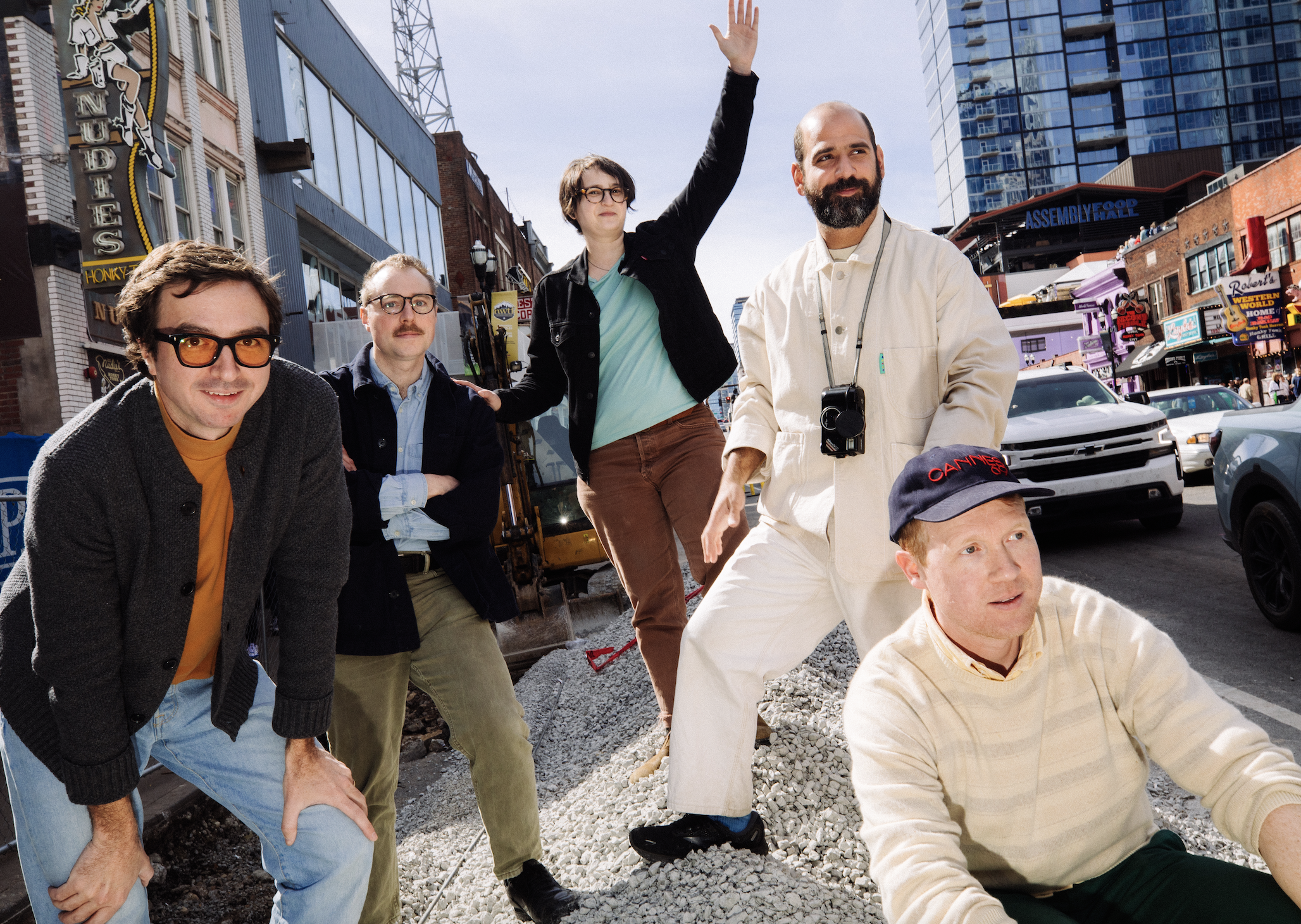Foto-© Sinna Nasseri
Die Indie-Rock-Band Real Estate hat gerade ihr neues Werk Daniel via Domino Recording Co. Veröffentlicht. Das sechste Studioalbum der Band aus New Jersey, bestehend aus Martin Courtney (Gesang, Gitarre), Alex Bleeker (Bass, Gesang), Matt Kallman (Keyboards), Julian Lynch (Gitarre) und Sammi Niss (Schlagzeug), umfasst 11 neue Songs, die während einer neuntägigen Aufnahmesession im RCA Studio A in Nashville entstanden sind. Das Album wurde von dem GRAMMY-ausgezeichneten Produzenten Daniel Tashian produziert.
Wir haben mit Martin Courtney und Alex Bleeker in Berlin über Daniel gesprochen. Wir erfahren, warum Daniel nicht unbedingt nach einem bestimmten Typen oder gar dem Produzenten benannt wurde, sondern ein Symbol für die neue Leichtigkeit in der Arbeit der Band ist. Die beiden beschreiben die Arbeit an der Platte als einen Schritt zurück zu einer entspannteren Herangehensweise an ihren kreativen Prozess. Es war ihnen wichtig, sich auf das zu konzentrieren, was sie gut können, anstatt sich immer wieder aufs Neue beweisen zu wollen. Spaß an erster Stelle. Wir sprechen auch darüber, warum das für die Künstler ein so großer Schritt ist und vielleicht den manchmal etwas trotzigen Kreislauf von Aktion und Reaktion beim Schreiben neuer Musik durchbrechen kann.
 We need to start with the obvious question: Who is Daniel?
We need to start with the obvious question: Who is Daniel?
Martin Courtney: Daniel is no one in particular. The album is named Daniel. The most straightforward answer is we thought it would be funny to give the album a person name. Daniel was the first name we came up with. Obviously Daniel [Tashian] is the name of the producer, but we did not really name it after him. But I asked him if he would be okay if we named the album Daniel. I do not want to make him uncomfortable. It is…
Alex Bleeker: … a strong name. There is a very simple answer and there are several answers. It is multifaceted. The album is not named after a particular Daniel. It is the name of the album. It is like having a cat named Daniel and saying who is the cat named after? It could be named after another person, but it could just be Daniel. It felt like Daniel was the character of the record and we were all not sure why that was true, but we know it is true. It can also be named after any Daniel you like. I have a Daniel that I associate with the record. I have shared that with other people in the band and they are like, “No, no, I don’t feel that way at all.
Does your Daniel know?
Alex Bleeker: I do not think he does know, but that is very personal. I invite you to name it for your own Daniel.
When the name Daniel matches the energy of the record, how would you describe the character of the album?
Martin Courtney: Well, I do not know how the name Daniel matches the character, but to me it is a very warm and welcoming record with some depth of emotion. Obviously, the goal for us making this record was to try to make something that felt like a collection of straightforward pop songs with strong melodies. And that was the game that we were playing, seeing how close we could get to a perfect pop record.
Alex Bleeker: It was really clear from the beginning even before I had heard a note of music Martin was writing. That was a little bit of a different pathway for us; there was concept early on. We may have said this to you four years ago, but that concept was a lot more grandiose and vaguer, and this record was almost a reaction to that one. [We spoke about their last record The Main Thing in 2020.] I wanted to make very poppy, catchy, accessible songs that are recorded that sound like it is a band playing a record and that the sound quality is very clear and shiny and high fidelity.

With The Main Thing, we talked about how the record has shaped different roles inside the band and how that gave you a new perspective on the band. What do you take away from Daniel?
Martin Courtney: I looked at it as a way to really have fun making music again. Which is not to say that I did not have fun before, but it became more and more complex in my mind to want to make things that felt like you were always topping the last record and trying to see what you could do to expand. We were very serious about The Main Thing.
Alex Bleeker: There was a dense, serious energy around the recording of it. It felt like we were putting all this pressure on ourselves, and the stakes were really high. You always make a record in reaction to the one you made before. We added a lot of different instrumentation and ideas in the studio, and it took us a very long time to make this record. We were very much in our own heads about it, intellectualizing what it could mean. It even had this meta storyline of the main thing is us, you know, and that is like “Who is Daniel?” And I was like, “I do not know.” We felt heavy at the time. And then it was immediately preceded, weeks later, by something heavier than any of us could have imagined for years that we are still feeling the heaviness of. This is not to say that it is not a difficult time now. Of course it is. I think at that time we wanted to do something that would rise to the occasion of the heaviness in the world. And now we are all very comfortable or at least aware of that heaviness. And we can do something that has a lightness to it, to shed a little light on all that.
It is a powerful thing to decide for lightness. I imagine that to be a longer process in the in the background than just waking up and deciding to bring in some lightness.
Martin Courtney: It was. The choice it began with was that I want to have fun writing these songs and not think too hard about any particular decision and allow these songs to flow. And then that came through to the lyrics as well. The whole point of the record is to try and make something that is sort of counteracting everything else.
 If each new record is a reaction to the last, has there ever been a question of whether there will be another?
If each new record is a reaction to the last, has there ever been a question of whether there will be another?
Alex Bleeker: So far there has not been.
Martin Courtney: To be honest, not that I ever thought that we would not make another record, but this was the closest to being like “When is it going to happen? The circumstances of life are getting more complex and making a record was going to be a lot of commitment. It feels like a more monumental decision because I have seen what it entails many times in the past. It all went into it, for sure – trying to make something that feels good and to enjoy the process.
Alex Bleeker: There was a narrative around the last record of it being centered around all the anxiety, at least for us personally: of a 2020 election and the dark ages of Trump, which are now descending upon us again. Does it even make sense to make a record in such a heavy world and what is our place in it? And those are the kind of themes we were talking about then and the existentialism of the band and the record and getting older and that is part of the heaviness of it. And it is funny that you [Martin] say that it seemed like a more monumental decision to do this one, but it felt like it happened in a more effortless way, with less to prove, with less concern, and more like, “Hey, you know, let us make another one!”
Martin Courtney: Well, I mean, once the decision was made, it was more like if we are going to do it, let us have fun doing it. Actually now that I had such a good time making this record and I am so happy with how it turned out, there is less of an urge for me to react against it. Maybe we just do the same thing again or there are other things we want to do. This record was partly about making an album of pure pop, just 3.5 minute pop songs, because that is one facet of this band. In the past we always had that as a part of our sound, but we also had these longer songs and these more jam or psychedelic songs. At first I was like, “What if we do this and then the next record is instrumental, more ambient and exploratory, or more psychedelic?” Which still sounds super fun to me. But at the same time, it might be fun to just write some more pop songs, because that was pretty fun.
Alex Bleeker: It is not necessarily a reaction against it. But this seems like the most obvious thing in the world, you are reacting to the circumstances around you, but the previous record just colors what you want to do next. We felt like this one was a success. It was really good. There is probably more for us in this lane.
How did you bring that lightness to the recording process? Did you make any changes to previous work schedules to capture the live spirit?
Martin Courtney: A lot of it happened not intentionally. We had not really been able to spend a lot of time together over the preceding years. Just being together, making music was really fun. And then working with the producer Daniel Tashian. He is Grammy winning, super successful, you know. Part of me thought maybe he was going to be very professional in the studio or buttoned up or something. But he really brought so much good positive energy.
Alex Bleeker: He was very whimsical and childlike. He is his own unique kind of spiritual force and energy. He would almost conduct the energy of the room. And if we were working on something more mechanical and he was bored, he would fall asleep on the couch and then he would snap back up right when he needed to be there.
Martin Courtney: There is that and then there is also us being in the studio that we ended up recording in, which came together right at the last minute. We knew we were going to be in Nashville, but we were not sure where. We ended up being in this amazing, historic, massive studio that felt very monumental for us. We never recorded in a place that grand before. It felt cool. We felt very fortunate to be there. All these things just felt like a very positive experience with record.

The press text about Daniel said that it is about the realization that it is enough to be who you want to be. I feel like that is more than enough. Do you think with this record you have figured out what you want to be like?
Alex Bleeker: Out of context, it does sound like the grand quest to discover who you are or something like that. But I think, the way that he meant it is that this record is quite beautiful in its simplicity and in its acceptance of its sound and what it is, and it feels kind of easy in a way. It is about graceful ease inside of something. For a few years after our first three records, we internally raged against this critical sentence that was always said about us, which is that real estate is a sunny, breezy, toe tapping music that is light for the days of summer. We were like, “Well, yeah, but we got other stuff in there too.”
Martin Courtney: Even more generally, just the fact that we had a very recognizable sound, which was stated over and over and over again and we thought it was trut, but we can do other stuff.
Alex Bleeker: The songwriting on this record will probably be sad again, but it was a decision to recognize that we do that particular thing pretty well. This record refines that and makes it better and takes it to a further point and serves that thing that we can do as best as we can. It feels like this is a mature record and the previous ones that we called mature were kind of adolescent. Real maturity is learning what you can do and doing it well as opposed to trying to be different. There was none of that kind of energy in the studio.
Martin Courtney: The whole process of writing, recording and then even everything after that, like naming the record and the artwork, it all felt very natural and just kind of fun.
Alex Bleeker: It feels important not to take ourselves too seriously this time. And that is more true to who we really are.
 It sounds like you were able to really follow through from the first idea you had when you started making the record.
It sounds like you were able to really follow through from the first idea you had when you started making the record.
Martin Courtney: Which was easy because we wanted to do what we do really well and not try to do anything else. This is the first record where we really had a roadmap for what we wanted and stuck to it.
What is the roadmap for the playing it live now? What is your plan to translate that into the show?
Martin Courtney: Luckily, this record is really us. The intention was to make something that sounds like us and sounds like a band. Obviously, there is a pedal steel on a couple of tracks and there are more subtle embellishments, things that add to the sound. But there are no strings or things that might be hard to translate live.
Alex Bleeker: We have a couple of shows coming up that are kind of different than your typical shows. We have a release show in New York City and, this is not really true, but it is mostly true that you have to be Daniel to get in. That has to be your name or you have to have it in your name somewhere and you can bring a guest or, you know, if your last name is Danielson or anything derived from Daniel in any way, in any language, which is very silly, but it tries to be fun and interesting. And then a couple weeks after that, the first show of the real tour, we basically do a bingo show. We write down a bunch of different songs and some things that are not even songs on these balls for us to do and then they come out randomly. It will be more of a party. Everything we describe is lighter, it is fun, it is thinking a little bit different. It is like settling into reality, not taking ourselves too seriously. I guess we will do more of that. I would like to do this kind of thing randomly on tour stops.
Thank you for the interview!










